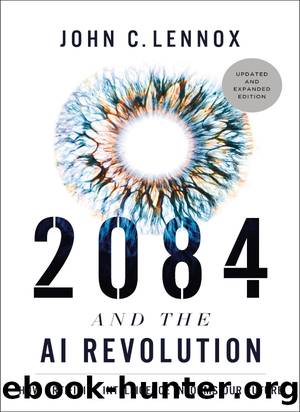2084 and the AI Revolution: How Artificial Intelligence Informs Our Future: Updated and Expanded Edition by John C. Lennox

Author:John C. Lennox [Lennox, John C.]
Language: eng
Format: epub
Publisher: Zondervan
Published: 2024-10-02T00:00:00+00:00
Orwell argued that Lewisâs book âwould probably have been better . . . if the magical element had been left out,â and he objected to the ending in which N.I.C.E. (National Institute of Co-ordinated Experiments) is overthrown by divine intervention: â[Lewis] is entitled to his beliefs, but they weaken his story, not only because they offend the average readerâs sense of probability but because in effect they decide the issue in advance. When one is told that God and the Devil are in conflict one always knows which side is going to win. The whole drama of the struggle against evil lies in the fact that one does not have supernatural aid.â70
On the contrary, Lewisâs belief in the supernatural strengthens the story. Firstly, knowing which side is going to win in the struggle between good and evil has never spoiled any story for me or anyone I know â think of The Lord of the Rings, for instance. If there is a God and a supernatural dimension, then leaving it out will diminish the story, since it will be told in a framework that is less than the whole and so omits part of reality. Also, it is not true that the addition of supernatural aid detracts from the drama. It all depends on the nature of that aid and the way in which it is employed, or not employed, as in the case of Jesusâ refusal of angelic help when he was facing the cross.71
All of these dystopias and, indeed, most futuristic AI scenarios tend to assume that human beings will always be on the earth. The exception here is the oft-mentioned speculation that an AGI, if ever created, may decide to dispense with humanity. In other words, the human race will come to an end and be replaced by machines. Indeed, reminiscent of C. S. Lewis, neuroscientist Iain McGilchrist, in his keynote to the AI World Summit 2022, speaking of cyborgs, said that âthe best way to destroy humanity will be to hybridize it with a machine.â72
An alternative scenario to C. S. Lewisâs âabolition of manâ is the subject of a piece of dystopian writing that is not so well known â P. D. Jamesâs novel The Children of Men, written in 1992 and set in 2021. The book takes the form of a journal written by Oxford historian Theodore Faron, who is the cousin of the despotic Warden of the police state of England. The key idea is that the entire world, in which nation after nation has been recording a rapidly declining birth rate, is gradually engulfed by a mysterious pandemic of infertility so that in 1995 the last human child is born. That year was designated Omega, and the children born in it were called Omegas, about which James makes the prescient remark: âIf from infancy you treat children as gods, they are liable in adulthood to act as devils.â73 The human race stands threatened with extinction. In an interview, P. D. James said that
Download
This site does not store any files on its server. We only index and link to content provided by other sites. Please contact the content providers to delete copyright contents if any and email us, we'll remove relevant links or contents immediately.
The Lost Art of Listening by Michael P. Nichols(7506)
Why I Am Not A Calvinist by Dr. Peter S. Ruckman(4153)
The Rosicrucians by Christopher McIntosh(3519)
Wicca: a guide for the solitary practitioner by Scott Cunningham(3178)
Signature in the Cell: DNA and the Evidence for Intelligent Design by Stephen C. Meyer(3138)
Real Sex by Lauren F. Winner(3022)
The Holy Spirit by Billy Graham(2952)
To Light a Sacred Flame by Silver RavenWolf(2823)
The End of Faith by Sam Harris(2742)
The Gnostic Gospels by Pagels Elaine(2531)
Waking Up by Sam Harris(2459)
Nine Parts of Desire by Geraldine Brooks(2368)
Jesus by Paul Johnson(2362)
Devil, The by Almond Philip C(2331)
The God delusion by Richard Dawkins(2309)
Heavens on Earth by Michael Shermer(2284)
Kundalini by Gopi Krishna(2184)
Chosen by God by R. C. Sproul(2164)
The Nature of Consciousness by Rupert Spira(2108)
